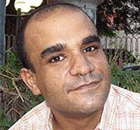In the last few weeks cyber politicising has centred on the presidential elections. Apart from a few smallish boycott campaigns on Facebook, few have discussed the significance of what—were it not for the Washington-blessed military-and-Islamist pincers holding political reality in place—would have been the most significant event in Egyptian history since 1953.
No one has brought up such issues as the absurdity of running in the absence of a constitution (i.e., on a programme that may prove impracticable once the constitution is drafted), the fact that the democratic process is untenable under the hegemony of a military junta, or the lack of any difference between rigging and obtaining votes by distributing sacks of rice or bottles of cooking oil or indeed gas cylinders a la Muslim Brotherhood campaign strategy.
The politicising has centred, rather, on who to vote for—and activists as much as analysts, both professional and amateur, have displayed disturbing levels of hysteria in championing the cause of their candidate of choice, fuelled either by supposed loyalty to the revolution and its martyrs or by concern for the future of security and economic stability—with the result that the scene looks like a football match in which the players are substandard and the two teams on the field (the Islamists and the Feloul or "remnants of the fallen regime") are vying for supporters of a third (the Revolutionaries) that has been disqualified from competing.
Of the 13 candidates, four remain more or less completely unknown. Three (the Islamist intellectual Mohammed Selim El-Awa, the oppositional judge Hisham El-Bastawisi and the leftist MP Abul-Ezz El-Hariri) are generally believed to have little or no chance. And one would seem to be running more to demonstrate that he can than to actually win: the young lawyer and activist Khalid Ali, perceived by the writers-and-artists ghetto as the revolution's candidate—"the romantic dreamers' choice," as it has been put—comes across as an unintelligent parody of the populist orator, barely adequate for the presidency of the Youth Centre at the working-class neighbourhood-cum-shanty town of Habbaneyya.
Five candidates remain, only one of whom—the well-known Nasserist politician Hamdeen Sabbahi—remains outside the Islamist-Feloul polarity. Despite Arab nationalist and centralist hangovers, reported affinities with Saddam and Gaddafi, and occasional statements in support of Al-Qaeda, Sabbahi's programme would seem to be the pragmatic-progressive path of least resistance under the circumstances; and those relatively sensible tweeps and Facebookers who are cured of spasticity have switched to his side.
But it is regarding the four polar candidates that most of the cockfights have taken place: the conservative Muslim Brotherhood's Mohammed (Spare Tyre) Mursi, who ran in place of Khairat El-Shater when the latter was legally blocked from running; the reformist Muslim Brotherhood's Abdel Moneim (Retired Terrorist) Abul-Fotouh, who had to resign from the Muslim Brotherhood in order to run; the former air force commander, civil aviation minister and last prime minister under Mubarak Ahmad (George W.) Shafiq; and the former foreign minister and Arab League secretary Amr (Cigar Bey) Moussa.
Not to suggest that they are any less likely to win than the other three, Spare Tyre and George W. have elicited more mockery than critique, as they are patently empty dummies of what they stand for: respectively, corrupt quasi-theocracy whose principal achievement thus far has been organising mass female-genital-mutilation bonanzas in the provinces, and the pre-25 Jan status quo. Apart from the latter's often hilarious verbal blunders ("Unfortunately the revolution succeeded", or "I fought for my country: I killed and I was killed"), they have done nothing to induce any strong feelings—or change anyone's mind about anything.
So it is to (especially liberal) supporters of Retired Terrorist and their cigar-lighting detractors that much of the frenzied pecking has fallen; who will draw blood first remains to be seen. As it has been repeatedly pointed out, however, the pro-revolution, conscientious and "enlightened" face of the Brotherhood is as fanatical as the best of them: suffice to say that, on air, he broke down in tears over his differences with his comrades in arms more often than over anything else; he expressed respect for the assassins of president Sadat, and never repented being a founding member of the Al-Jamaa Al-Islamiya (which was responsible for the bulk of tourist bombings and assassinations of secular figures during the 1990s), so even if he has renounced violence, Abul-Fotouh's loyalties are clear. Drinkers, unmarried couples, creative people and other believers in personal freedom can look forward to various forms of elimination or refugee status abroad.
Amr Bey, on the other hand—though infinitely more sophisticated and articulate than Shafiq—is a self-acknowledged pillar of the post-9/11 world order; he tries to curry favour by pretending to have championed the Palestinian cause when in fact he is among the architects of the defunct peace process; he is old and arrogant and unlikely to shy away from heavy-handed suppression of the opposition, probably by now more interested in his cigars and other pleasures than anything else indeed.
Still, when all is said and done, the action is only just beginning. Now that it is watermelon season, watching while we make obscene squishy noises and drip red liquid everywhere should be fun. Needless to say, this writer is boycotting the presidential elections.



